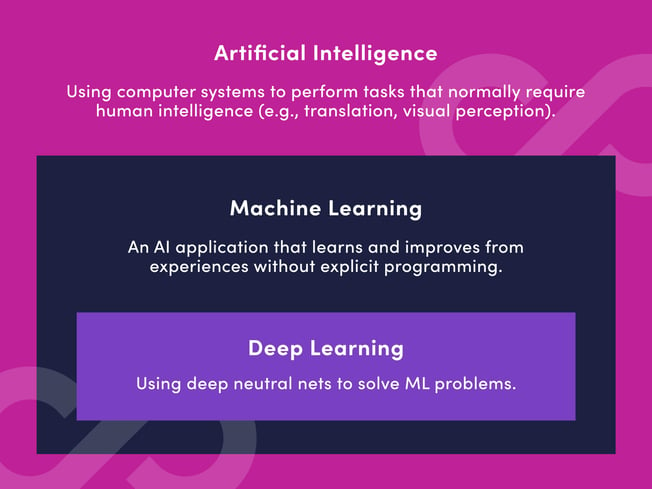Key Takeaways
-
With AI and machine learning, ecommerce companies can optimize customer experiences, increase retention, improve customer support, and enhance decision making. These technologies allow for customized customer experiences based on millions of data points, leading to increased customer satisfaction and sales.
-
Effective utilization of AI in ecommerce requires a data-driven approach. Understanding key metrics such as conversion rate, average order value, and cart abandonment rate is crucial for correlating AI personalization strategies with business goals. Embracing data and selecting the right platform are vital steps in leveraging AI effectively.
It feels like AI is taking over almost every industry. But what about its functionality makes it so useful for online retailers?

Sixty-five percent of customers claim that their digital experience strongly influences whether they recommend a brand. With digital consumer experiences holding such a strong sway over brands, retailers must understand how to optimize these experiences using artificial intelligence (AI) and machine learning (ML).
Some people are unaware AI is even used in ecommerce. When people hear AI, they think of generative AI, like ChatGPT or DALL-E. But in reality, the ecommerce industry has been a key player in experimenting and leveraging AI. With the right strategy in place, ecommerce companies can use AI to increase retention, improve customer support, and enhance their decision-making.
Today, you’ll learn the basics of this technology and its use cases with Rebuy’s Director of AI, Cameron Wolfe.
What Are AI and ML?
AI is the umbrella term for any technology that simulates human intelligence. Behaviors may include learning, reasoning, sensing, or adapting.
For instance, natural language processing (on text), voice recognition (on speech), visual search, and image recognition are all types of AI. On the most basic level of AI, humans write rules that AI reads and then returns an output given certain conditions.
Machine learning (ML) is a more advanced form of AI that uses patterns of behavior charted through input data to create a set of rules (known as an algorithm) for output. One class of ML is often referred to as “deep learning,” and it’s what ChatGPT is built on.

The primary trait of ML is that the developer doesn’t codify the intelligence or write the logical tree. Instead, the machine learning application will generate the algorithm based on the training data sets.
Machine learning can typically be formulated in three steps:
- An input
- Data-dependent processing
- An output
How Are AI and ML Used in Ecommerce?
There are millions of data points on each person on the internet: how and where they live, things they like to buy, and where they like to shop online. Machine learning algorithms use that information to create a customized customer experience.
If you’re looking to implement AI and ML on your website, you don’t need to be an expert on AI, nor do you need to hire an engineering team with AI training experience. Instead, there are many existing platforms and tool add-ons, like Shopify and Rebuy, that take your existing customer data and help you configure a personalization strategy.
Pro Tip: If you use Shopify, check out this list of the best Shopify apps to install in 2024.
The key is to find a machine learning solution that acts as a recommendation engine. It should enable you to test out different strategies till you find the one that works best for your business.
Website Personalization and Testing
A/B testing helps you determine which product recommendation system is effective on your site. A tool like Rebuy provides various configurability options that allow you to personalize the AI actions. Then you run tests to figure out how to make the user experience even better.
But not all personalization efforts work for every company. Wolfe says the best way to get results is to figure out what works best for you. “Every merchant is different and one strategy of applying AI to personalize a website isn't going to work similarly for every website that exists," he explains. "Instead of just using the default behavior on a given platform, test different algorithms and see what impact it has on revenue.”
For example, say you send out a customer feedback survey to find out why your ecommerce sales are down. You discover that many of these customers simply couldn’t find what they were looking for, and they assumed you didn’t sell it. But you do!
AI can help surface the right products by generating more intelligent results on your online store’s search engine. It can also display more relevant products in the cart and on product pages before new customers abandon your store to go searching elsewhere.
.jpg?width=646&height=363&name=ai%20chip%20(comp).jpg)
Marketing and Advertising Personalization
Online businesses also use AI-driven personalization in their marketing strategies outside of their website. For example, AI and ML algorithms can analyze user behavior and patterns to target ads more effectively. This personalization ensures that users see ads that are more relevant to their interests, increasing the likelihood of engagement.
AI can also automatically generate ad content tailored to individual users by upselling relevant content. For instance, it might change the image, message, or format of an ad based on the user's previous interactions with similar content or their purchase history.
Profitability Optimization
AI and ecommerce machine learning also help businesses optimize their ad spend. ML algorithms can optimize bidding strategies in real time for platforms like Google Ads or Facebook ads. This helps companies get the most value out of their ad budget by adjusting bids based on the likelihood of ad success.
AI’s predictive analytics are also instrumental in inventory management and pricing optimization. With high-quality demand forecasting and churn prediction, AI can guide your supply chain decisions to help you avoid overstock and prevent stockouts. As a result, you reduce costs, increase sales, and keep your customers happy.
What Are the Top Advantages of AI Algorithms?
AI algorithms are faster and more scalable than human analysts. Theoretically, you could have someone who looks at the purchase behavior of customers all day. But that takes a lot of time, effort, and money before you can produce anything near the same results as AI, especially with such a quick turnaround.
And that’s where AI really shines. “The beauty of AI is you're using machine learning to do all that effort automatically," says Wolfe. "Sometimes, the patterns are going to be too difficult to deduce with just simple strategies. Machine learning can automatically model very complex relationships and learn to surface them in a way that makes it easier for shoppers to find products.”
And these machine learning use cases are crucial for increasing customer satisfaction and sales. In fact, 90% of customers will splurge on brands with personalized customer service. One way to step up your customer service game is to build an AI chatbot for discovering products and answering queries. Your customer service reps can’t be everywhere all the time, but an AI assistant works 24/7.
What Is a Common Challenge of Adopting AI and ML?
When you’re first starting out as an ecommerce business, your site and customer behavior data might be pretty limited. When a machine learning model doesn’t have enough data patterns to train on, it can’t make hyper-personalized actions or automate customer segmentation. In the ML space, this is called a cold start problem.
One way to combat this problem is to use an ecommerce platform that puts safeguards in place so it always produces reasonable results, even with limited data. For example, Rebuy automatically suggests products that are most frequently bought together, a process that requires little to no ML. Rather than recommending products based on behavioral patterns it doesn’t yet have, it recommends products that are similar.
According to Wolfe, it’s important to remember to give it time and trust that using AI in ecommerce is an evolving process. “When you’re first starting out, you need to tweak the way that you personalize until you have enough high-quality data. The fundamental thing with machine learning is that adding more high-quality data will always make it better.”
What Does the Future of AI Look Like for Ecommerce?
Right now, generative AI models tend to be generic. But in the future, we’ll likely see a specialization of language models in the ecommerce industry. This means it won't just be aware of products sold on a store's site but be able to fully understand their value for individual customers.
This will affect how we market and advertise in the online shopping landscape. Wolfe explains, “As generative AI trends continue, we’ll probably have promotional landing pages and advertisements completely designed by AI. Everything from high-fidelity images of the product to the copy to the page SEO will all be generated by this technology.”
For example, say a certain product is trending on your store. Your AI copilot would be able to create a landing page for you with images and copy that resonate with the particular audience you’re targeting.
Now, not only did this save you and your team the money and effort of creating the page, but it also happened in a matter of minutes or even seconds. So you go from knowing you have a viral product to immediately capitalizing on it with an effective landing page.
The Key to Effectively Leveraging AI Is Embracing Data
You don’t need to understand exactly how AI works to effectively use it in your ecommerce store. However, you do need to be data-driven. To make decisions based on data, it’s important to set and track key metrics, like the conversion rate, average order value (AOV), or cart abandonment rate. That way, you can accurately correlate which AI personalization strategies are most effective to reach your goals.
Finding the right platform for your business can help you embrace and leverage data. As you search for the tools to help you in your AI endeavors, put on that data cap! Test out the different capabilities, compare features, and track what you learn. Soon, you’ll be able to glean from the data which product is right for you.
•••
Try Rebuy free and see why the world’s top brands use Rebuy to accelerate sales growth.
Interested in partnering with Rebuy? Let's do it.
To keep up with the latest trends, platform updates, and more, follow us on LinkedIn.
.webp)